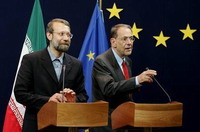America achieves progress in nuclear talks with North Korea
George W. Bush underlined "measurable results" from six-nation talks to persuade North Korea to dismantle its nuclear-weapons operations. He praised Japan's role in the process.

Japan's new prime minister, Yasuo Fukuda, standing beside Bush in the Grand Foyer of the White House, pledged to do his "level best" to get the Japanese parliament to restore naval refueling operations in the Indian Ocean that have been suspended. Bush issued a strong appeal for their resumption, saying they were vital to the U.S.-led war in Afghanistan.
The two leaders vowed cooperation on these and other issues that have strained relations in the past months between the world's two largest economies. It was Fukuda's first visit to Washington since he became prime minister in September.
High on their agenda was North Korea, and efforts to get the communist government to live up to its promise to abandon its nuclear ambitions.
"The six-party talks have delivered measurable results," Bush said. He said the plutonium-production facilities at Yongbyon, North Korea's main nuclear complex, "are now being disabled under six-party supervision."
Still, Bush said, much work remains to be done by North Korea, including North Korea's promise to provide a full declaration of all its nuclear programs and proliferation activities by the end of this year.
Bush welcomed Japan's role in the talks, which also include the two Koreas, the United States, China and Russia.
He said the United States would not forget the importance Tokyo places on the issue of Japanese kidnapped by North Korean agents in the 1970s and 1980s. Japan has linked the abductions to a satisfactory conclusion to the nuclear talks with North Korea.
"I understand how important this issue is to the Japanese people," Bush said.
Japan is seeking a greater role in the six-party talks and has urged Washington not to move too quickly in removing North Korea from its list of terror-supporting nations until Pyongyang accounts for the kidnapped Japanese.
"President Bush stated that he will never forget the abduction issue," Fukuda said.
"We agreed that Japan and the U.S. need to maintain close coordination with each other in order to achieve complete abandonment of all nuclear weapons and programs by North Korea through the six-party talks," Fukuda said through a translator.
Fukuda wants Bush to back away from a pledge to remove North Korea from a terrorism blacklist until the North accounts for the kidnapped Japanese citizens. Removal from the list is a primary North Korean demand in nuclear disarmament talks, and the Bush administration agreed in February to begin that process.
The two leaders took no questions in their joint appearance between morning meetings and a working lunch.
Bush pressed Japan to resume naval refueling operations in the Indian Ocean, a sore issue between the two countries. He said that, over six years, Japanese vessels had refueled ships from 11 coalition nations nearly 800 times.
Japan's opposition party blocked an extension of the operation, saying it violated Japan's constitution. The authorization expired on Nov. 1, and the ships have been called home.
"I communicated to President Bush that I will do my level best to achieve an early passage of a bill for the early resumption of refueling activities in the Indian Ocean by the Japanese," said the Japanese leader. "President Bush expressed his appreciation for Japan's support for the international community's fight against terrorism and the hope that refueling operations will be resumed soon."
Japan is America's top ally in Asia. But Japan, which has a pacifist constitution written by the United States after World War II, is debating its future contribution to the U.S.-led fight against terrorists.
Said Fukuda: "We should never allow Afghanistan to once again become a hotbed for terrorism, and we agreed that Japan and the United States should continue to work together with the international community in the fight against terrorism."
Bush said he and the Japanese leader also agreed that Iran must not become a nuclear-armed nation, condemned the crackdown by the government of Myanmar against democracy advocates and discussed climate change, energy, economic reform in Japan and efforts to restart world trade liberalization talks.
The refueling issue has been at the heart of political turmoil in Japan. Japan's ruling Liberal Democratic Party lost control of the parliament's upper house in July elections, although it still controls the lower house.
Fukuda took office after the sudden resignation in September of Shinzo Abe, who made the abduction issue a priority of his scandal-plagued administration. Abe followed the popular Junichiro Koizumi, a close friend and ally of Bush. On Myanmar, also known as Burma, Bush said he and Fukuda "call for the release of Aung San Suu Kyi and all other political prisoners. We're for a genuine dialogue between the regime and those who seek a democratic future for Burma." Suu Kyi is a detained opposition leader.
He said Japan had canceled an aid grant to Myanmar and was reviewing other projects to make sure they benefit the people of Myanmar.
Bush said he intended to serve Fukuda some American beef and expressed hope to have the Japanese market "fully opened to all U.S. beef and beef products."
Japan banned American beef imports over mad cow fears more than three years ago, but has eased that restriction to allow imported meat from young cattle as long as certain bones and the spinal cord have been removed and the meat has been processed at selected plants.
Subscribe to Pravda.Ru Telegram channel, Facebook, RSS!


